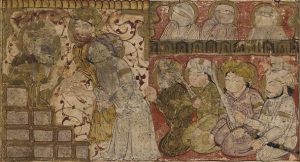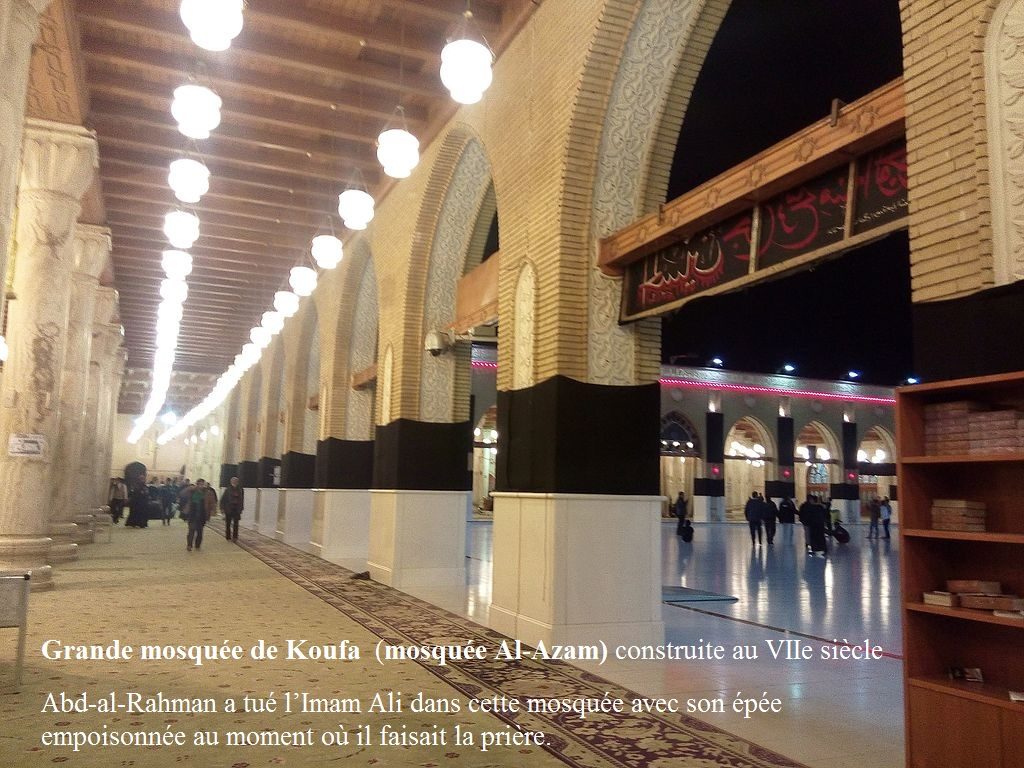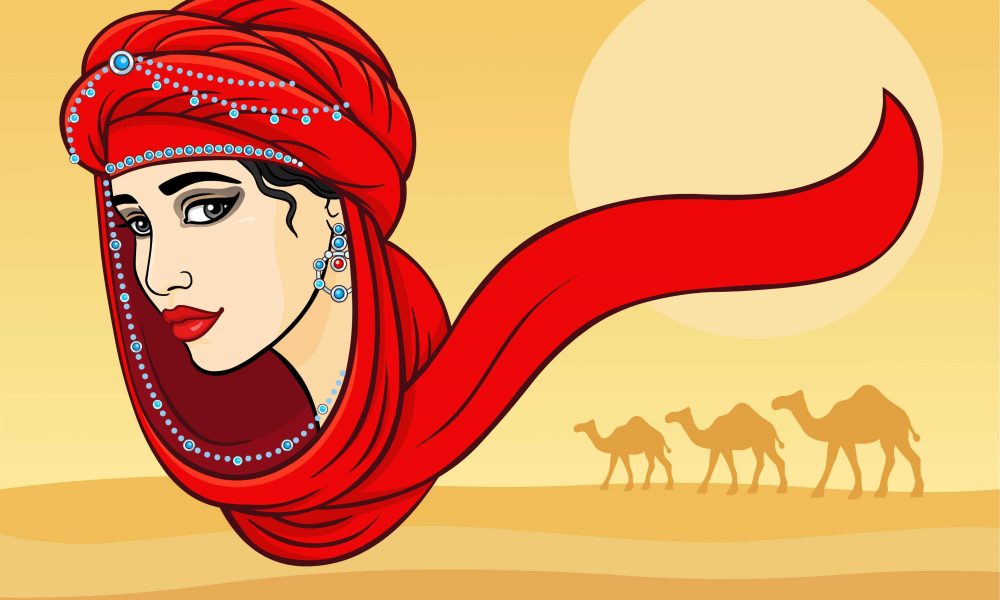
650 AD to 670 AD, Psalm 80: Aisha.
This site was first built in French (see www.147thgeneration.net). The English translation was mainly done using « google translation ». We have tried to correct the result of this translation to avoid interpretation errors. However, it is likely that there are unsatisfactory translations, do not hesitate to communicate them to us for correction.
(for that click on this paragraph)
Summary
This generation is from the years 650 AD to 670 AD.
According to our count, this generation is the 80th generation associated with Psalm 80. It is in this Psalm 80 that we therefore find an illustration of the facts of this generation.
The Muslim threat is approaching Constantinople. The capture of Rhodes triggers the Byzantine response which is disastrous. If Byzantium resists the Muslim attack it is mainly thanks to the tensions that begin to appear in the framework of the succession struggle with the caliphate of the Muslim empire.
Omar died in 644 (he was assassinated), the problem of succession arose again. Ali should have succeeded Omar because the college of six pretenders had chosen but because of a subterfuge is finally Otman who succeeds.
Apart from the new conquests, the highlight of Otman’s reign is the fixation of the Koran: An official version is imposed and all other versions destroyed. He is assassinated in 656. Ali succeeds him this time, but the Muslim empire is already disunited.
Muawiya contests Ali’s caliphate, which will eventually produce the split (schism) of the Muslim empire to the death of Ali (assassinated in turn in 661) and will trigger the beginning of the century of the Umayas (661-750, dynasty from Muawiya, hence the name).
Supporters of Ali and his descendants « dissent » and form the Shiite movement (resulting from schism) after trying in vain to succeed Ali, his son Hassan. This movement is opposed to the Sunnis (of Sunna, in reference to the acts and words of the prophet reported by tradition in the hadiths).
In this crisis, which is hindering the Muslim conquest and preserving the duality of the East / West, Christianity / Islam. Without it Byzantium could have fallen to this generation and Islam could have become hegemonic in the known world, as Christianity could have been without the emergence of Islam.
Indirectly, the Jews are no strangers to this crisis. During his lifetime Muhammad interfered in a case of adultery in the Jewish community by ordering that the offending couple be executed by stoning. It is all the less so that Mohammad following this judgment will find himself in a stalemate when Aisha, the only woman he married virgin, is found in the early morning in gallant company with a man with whom she spent all night alone.
Muhammad does not listen to Ali when he asks that he separate from Aisha at the very least. By advising Muhammad to repudiate Aisha, Ali had just made himself an irreducible enemy. Aisha will accuse him of having killed Otman thus managing to unite fighters against Ali whom he will have to fight.
Ali will first have to fight the partisans of Aisha, on the military level he succeeds. But ideologically he fails, as he deals with Aisha and his followers, Muawiya becomes Otman’s true successor. Ali is murdered in Kufa by one of his disappointed supporters. The death of Ali definitively seals the division of the Muslim world.
Talk
The Byzantine Empire threatened
The previous generation [1] ended in many conquests of the new Muslim power to the detriment of Byzantine power. Alexandria fell in 642 and Carthage in 647. The Byzantine empire thus impoverished must expect to see the Muslim threat approaching Constantinople.
This happens during this generation by a new warlike approach of Muslim armies. Until now, they feared fighting on the sea.
This apprehension disappears in this generation with Muawiya whose victories will soon allow him to challenge the power of Ali the fourth caliph:
- When[13] the Muslims seized Egypt, Omar b. Al Khattâb wrote to (his general) Amr b. Al-As and asked him to describe the sea to him. The other replied: « The sea is a huge being, ridden by weak creatures – like worms on the wood. » As a result, the Caliph forbids Muslims to sail. The Arabs, who did so, acted without his knowledge and were punished. This is how Omar attacked Arfaja b. Harthama Al-Azdi, leader of the Bajila, whom he sent on an expedition against Oman. When he heard that he had taken to sea: he scolded him in the harshest way. The ban lasted until the advent of Muawiya, who allowed Muslims to embark and wage holy war at sea.
In 644, Otman attacked Cyprus, which fell in 649, then attacked Rhodes in 654.
Constant II had succeeded his father Constantine III at the age of eleven in the summer of 641. He reigned over the Byzantine empire until 668, almost the entire generation.
Before attacking the Muslim threat, Constant II first tries to reunite Constantinople once again divided by religious quarrels. The capture of Rhodes triggers the Byzantine riposte which is disastrous. If Byzantium resists the Muslim attack it is mainly thanks to the tensions that begin to appear in the framework of the succession struggle with the caliphate of the Muslim empire.
Otman
Omar had taken the caliphate by taking care at first that Abu Bekr ensures the first succession of Muhammad, thus avoiding Ali comes to power. By doing so, he could easily succeed Abu Bekr, Ali being always removed from power. At his death in 656 (he is murdered), the problem of succession arises again.
Ali is one of the pretenders to the Caliphate, but Otman succeeds Omar.
According to Tabari, Ali should have succeeded Omar because the college of six pretenders had chosen but because of a subterfuge is finally Otman who succeeds.
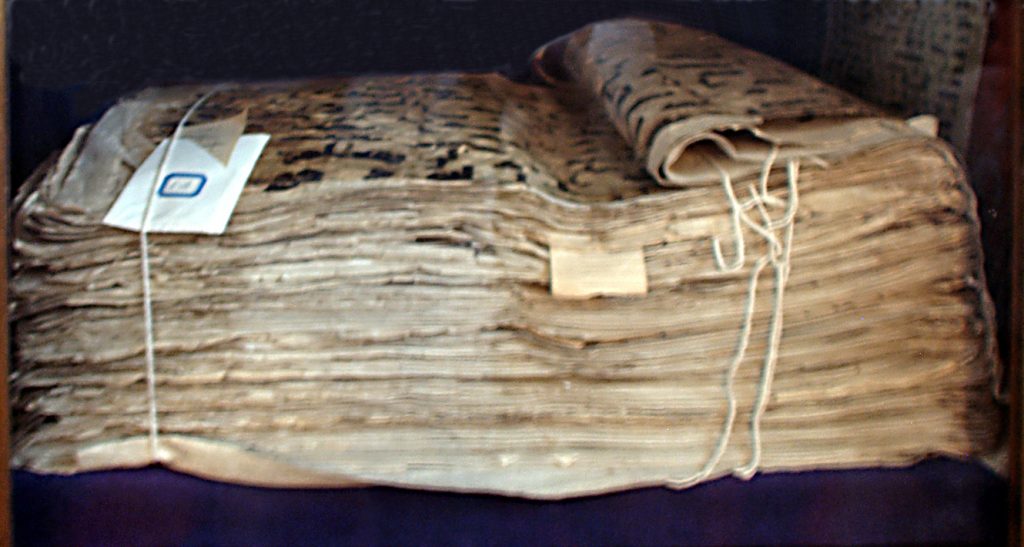
Apart from the new conquests, the highlight of Otman’s reign is the fixation of the Koran: An official version is imposed and all other versions destroyed. This is presumably the cause of his death, he is assassinated in 656.
Ali and Muawiya
Ali succeeds him this time, but the Muslim empire is already disunited.
Muawiya contests Ali’s caliphate for the death of Otman, which will eventually produce the split (schism) of the Muslim empire to the death of Ali (assassinated in turn in 661) and will trigger the beginning of the century of the Umayas (661-750, dynasty from Muawiya, hence the name) whose caliphs chose Damascus as capital.
Supporters of Ali and his descendants « dissent » and form the Shiite movement (resulting from schism) after trying in vain to succeed Ali, his son Hassan. This movement is opposed to the Sunnis (of Sunna, in reference to the acts and words of the prophet reported by tradition in the hadiths).
In this crisis, which is hindering the Muslim conquest and preserving the duality of the East / West, Christianity / Islam. Without it Byzantium could have fallen to this generation and Islam could have become hegemonic in the known world, as Christianity could have been without the emergence of Islam.
Indirectly, the Jews are no strangers to this crisis:
- Abdallah, son of Sheba [2], was a Jew from Yemen, who had read the ancient books and was very learned. He came (to Medina) to make a profession of Muslim faith in the hands of Otman, hoping that he would have regard for him. But Otman paid no attention to him, and Abdallah began to whine all over the caliph. When he was informed, he exclaimed, « Who is this Jew? » And he drove him out of Medina. Abdallah went to Egypt, where a great party formed around him, which held him in great honor because of his knowledge. When assured of his influence over these people, he expounded his doctrine in these terms: Christians say that Jesus will return to this world. But Muslims have more right to pretend that Mohammed will come back; for it is said in the Qur’an: « Surely, he who gave you the Qur’an will bring you back to the point of your departure. » A number of people accepted this belief, and when it took root, Abdallah made another. God, he said, had in this world one hundred and twenty-four thousand prophets, and each of these prophets had a minister (vizier). But Mohammed’s minister and lieutenant was Ali, and he was the one who was to succeed him. Otman illegally seized power; for when Omar established the council of election, all (the members) agreed to proclaim Ali, and Abd-er-Rahman, son of Auf, had already taken his hand to take his oath; but Ali was deceived by Amrou, son of Al-Aç, so that Abd-er-Rahman took Otman’s hand and swore an oath to Otman. Otman has thus usurped power. […] The people, having been seduced by the doctrine of the Second Advent of the Prophet and the right of Ali to authority, rallied to it and declared Otman unfaithful. But this secret belief was kept, while publicly it was preached the duty to do well.
Another Jew sided with the opposite side. The latter is first of all one of Omar’s advisors:
- Ka’b al-Akhbar [3], a Jew, who this year had embraced Islamism, a very learned man, who had read many books, was present at the assembly; He spoke and said: Prince of Believers (He speaks to Omar), which side do you want to go to first (Omar wondered whether to go to Syria, where there was an epidemic, or to Iraq )?
According to Tabari, this character predicts to Omar his next death:
- The next day [4] (where Omar had a dialogue with a slave whom he senses will be his murderer), Ka’b al-Akhbar came to the caliph and said: Prince of Believers, make your will; because you only have three days left to live. – How do you know ? Asked Omar; did you find in the Pentateuch the name of Omar, son of Khattab? Ka’b replied: I did not find your name there, but your description, along with that of the Prophet, says that you will be his vicar and how long your reign will last. But your reign ends in three days.
It is still this character, who according to Tabari always predicts to Muawiya his coming advent, while the conspirators favoring Ali at the same time elaborate their plan to lay Otman:
- Now [5] of all Otman’s agents, the worst was Abdallah, son of Sa’d, son of Abu Sarh, governor of Egypt. The people of Egypt sent letters everywhere, in which they made complaints against Abdallah and Otman, and a concert was made to depose Otman and put another in his place. But in no letter was mentioned the name of Ali. The agents of the caliph became acquainted with this correspondence between the different towns. The conspirators agreed to send a certain number of people to Medina for such a month and day, to depose Otman and put in his place one of the companions of the Prophet, Ali, Zobair or Tal’ha. Nobody put forward Muawiya’s name, and he did not have such views. Yet one day he was talking with Ka’b al-Akhbar, and he said to him, « I have found in the books that Atman will be overthrown and killed ». Muawiya said: « What can I not know who will reign after Otman, to make him my court! » Ka’b replied: It is you who will reign but it will be after many struggles, revolutions and after a lot of blood has been shed. It was from that day that Muawiya conceived the idea of coveting power.
Insurgents, mainly from Egypt, besiege Otman in Medina and eventually kill him. He is denied a burial in the Muslim cemetery and his body is « relegated » to a Jewish cemetery:
- When [6] the prayer was over, three Ançar […] accompanied by several others, presented themselves and forbade burying him in the cemetery of the Muslims. Now beside the Baqi ‘, and separated from this place by a wall, was the cemetery of the Jews; that’s where Otman was buried. Later, when Muawiya, son of Abu Sofyan, was the undisputed ruler of the Muslim empire, he had the wall between the two fields cut down, and joined the Jewish cemetery to the Muslim cemetery. The side where Otman is buried is called the Beni-Omayya cemetery.
The death of Otman brings down the last obstacle to the accession to the caliphate of Ali.
Aisha
This one is named, but the challenge comes quickly. The Beni-Omayya, accusing him of the death of Otman, are the first to challenge and take refuge with Muawiya. The latter does not recognize Ali’s caliphate and remains sovereign over Syria.
To this nascent rivalry, another, born of old grudges, adds to it further weakening Ali’s position.
This other rivalry originated indirectly when Muhammad wanted to interfere with the interpretation of Jewish law during adultery committed in the then Jewish community.
It is a case of adultery committed between a married man and a woman both Jews (- for Ibn Ishaq, it is the Jews who ask a judgment to Muhammad to test if he is really prophet, he is little likely that these endanger the lives of two of their co-religionists for such a test – ). The initial sentence of the rabbis consisted of a humiliating flogging, in keeping with the rabbinical tradition that never applies the death penalty, respecting a reasoned interpretation of the Torah (- which otherwise condemns killing in the Ten Commandments – ). When Mahomet intervenes on this case, he claims the stoning:
- Ibn Ishâq [7] says: Muhammad b. Talhah b. Yazid b. Rukânah on the authority of Ismā’îl b. Ibrahim, according to Ibn ‘Abbas, told me that he said: Allah’s Messenger ordered them to be stoned. They did it in front of the door of his mosque. When the Jew felt the stones, he went to his companion and protected her from stoning, until they were killed together.
The desperate gesture of love of the tortured to his companion, who obviously did not leave the commentator insensible, proves to himself that stoning was not the right sentence in this case.
It is all the less so that Mohammad following this judgment will find himself in a stalemate when Aisha, the only woman he married virgin, is found in the early morning in gallant company with a man with whom she spent all night alone.
Indeed she had left her litter at night, and having lost her way (- according to the official version of Aisha – ) took refuge with the one in charge of escorting the rear of the convoy.
In the early morning, Muhammad, not finding her, sent for her by Ali:
- The Prophet [8], having noticed at the first station the absence of Aisha, sent Ali back. The latter met Çafwân driving Aïcha, asked what had happened, and Aïcha told him. Ali returned hastily and informed the Prophet. It had been known in the army that Aisha had not been found in her litter. When she arrived at Çafwan, Abdallah, son of Obavy, said: Aisha is excusable in what she has just done; for Çafwan is more handsome and younger than Muhammad. Each expressed his opinion.
Even if adultery is not proven, Aisha’s delicate situation, following the rules of the time, should have resulted in a sentence identical to that applied to the Jewish couple: stoning.
But if Muhammad remained wary of his wife for a period of time, he ended up absolving her despite Ali’s advice:
- Then [9] the Prophet called Ali, son of Abu-Talib, and Osama, son of Zaid, and questioned them about Aisha. Osama, who had been brought up in the house of the Prophet, said: I never saw that she did anything reprehensible, neither in fact nor in words; I swear. Ali spoke thus: Apostle of God, deliver yourself from these difficulties; there are many women in the world; if there is in your mind a suspicion with regard to that one, choose another.
Finally, Mohamed does not listen to Ali. Following the Muslim tradition, an intervention of the angel Gabriel exonerates Aisha. Following this revelation, the Qur’an itself incorporates conditions that make it difficult to convict the adulterous woman, because it requires four witnesses to testify. In the opposite case, it is those who have dared to testify who are punished:
- As [10] for those who accuse honourable women and do not bring four witnesses, strike them eighty lashes, and never accept any testimony from them after that, and they are transgressors,
This sentence was also applied to those who had put Aisha on trial.
This Sura (all or part) is considered as specially descended to Muhammad to counter the calumny on Aisha. The Koran in its current version was frozen by Otman; Ali who had lived the event recounted may not have appreciated this insertion which exonerates Aisha.
Schism
In any case, Ali, by advising Muhammad to repudiate Aisha, had just made himself an irreducible enemy. What was going to be fatal to him:
- Aicha [11] was the enemy of Otman; she had constantly stated that he had to amend or abdicate. By the time he was besieged in his hotel, she had left for the pilgrimage. But when Ali had been proclaimed Caliph, she was very angry, for she kept a grudge against Ali for the language he had held to the Prophet, from the time that she had been slandered and accused of adultery. […] Since Aisha was unhappy with Ali’s appointment, she said that Atman had been killed unjustly and that he had to avenge his death. It was just when she had just left Mecca that she learned of these last events. She immediately retraced her steps, saying: My place is no longer in Madina. All those who fled from Medina gathered around her and committed themselves to her. They told him in detail how cruelly Otman had been killed, and she cried and cried, « God have mercy on Otman! It is a duty for all Muslims to avenge his death!
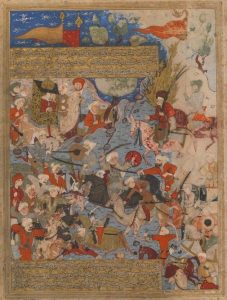
Ali will first have to fight the partisans of Aisha, on the military level he succeeds.
But ideologically, he fails, while he deals with Aisha and his supporters, Muawiya is a real successor to Otman.
Ali is still militarily gaining the upper hand, but when he seeks the advice of the council to designate Otman’s successor again, Muawiya is elected. The fact of not being able to impose itself will make that he will be neglected including of his followers.
He is murdered in Kufa by one of his disappointed supporters.
Hasan, his son, tries unsuccessfully to succeed him; he quickly negotiates his abdication with Muawiya and according to tradition he dies poisoned by the latter.
The death of Ali definitively seals the division of the Muslim world, on the one hand, the supporters of « tradition », the Sunnis, and those who grant and will give a preponderant place to Ali and his descendants: the Shiites.
Constantinople does not fall
With the Muawiya Caliphate, the Muslim empire, which moves its capital to Damascus, is expanding. But the parenthesis of Ali’s caliphate, and schism, make it impossible for this empire to seize Constantinople (at least for almost a millennium) and must « content itself » with an extension to Asia, and the Mediterranean side to the west, to the Maghreb and soon Spain.
Islam prevented the world from becoming entirely Christian, which would have been fatal to Judaism. By schism, he failed to supplant Christianity. The world will be Christian and Muslim, leaving room for Judaism.
The empire initiated by Muhammad quickly lost its uniqueness as before that built by David and Solomon. At the death of Solomon [12], Jeroboam of the tribe of Ephraim led the revolt that led to the schism between Judah and Israel.
The schism was both political and religious because to avoid reliance on temple worship in Jerusalem, Jeroboam created an idol worshiping cult in Bethel and Dan.
It is by this parallel that the psalm of this generation begins to illustrate this generation marked by schism within Islam:

- For the conductor, to the roses, a testimony, of Asaph a song.
- O Shepherd of Israel, hearken, He Who leads Joseph like flocks, He Who dwells between the cherubim, appear.
- Before Ephraim, Benjamin, and Manasseh arouse Your might, and it is for You to save us.
Before the arrival of Islam, the fate of Jews subjected to Christian power was not very promising. Ephraim and Manasseh are the children of Joseph born in Egypt. It is from Ephraim that the schism with Judah will be born, Manasseh can not be dissociated from Ephraim. As for Benjamin, he plays an arbitrator role in the schism between Judah and Israel.
Balance between law and faith
The Arabic legend gives Ka’b and Abdallah, two Jews, a significant role in the Muslim schism. But it is more doctrinally that schism occurs.
The Christians adopted the Jewish monotheism by removing the laws, considered too restrictive for the pagan peoples to convert. The law was replaced by faith and compensated mainly by the deity given to Jesus, the « Prophet of Christians ». It is on the nature of this divinity that the Christians divided themselves, interpreting differently the part of human and the part of divine of Jesus.
The Muslims, rich in this experience, dismiss any part of divinity to their prophet Muhammad, and, like the Jews, try to cement their followers around the law.
A law based on Jewish law but adapted to allow easy dissemination among conquered and converted peoples. But this will be the pitfall that will lead to schism, as illustrated by Aisha’s accusation of adultery, where the lack of maturity of Muslim theology goes, in the divergence of interpretation of the Koranic texts; bring about division and schism.
It is this schism within Islam that the following Psalm evokes:

- O God, return us; cause Your countenance to shine and we shall be saved.
- O Lord God of Hosts, how long have You been wroth at Your people’s prayer?
- You have fed them bread of tears, and You have given them to drink tears in large measure.
- You have made us the target of strife to our neighbors, and our enemies mock themselves.
« Our neighbors« , as illustrated in the previous psalm, represent the Arabs. As already stated, the Arabic legend gives Ka’b and Abdallah, two Jews, a significant role in the Muslim schism. But it is more the adaptation of the Jewish law in Moslem law which creates the conditions of the schism. Meanwhile, the fate of the Jews in Christian kingdoms (« our enemies« ) is deteriorating especially in the Visigoth kingdom (Spain).
Towards a dichotomous world
While supporters of Ali and Muawiya fight, Muslims offer unexpected respite to the Byzantines. This has the consequence that the Muslim push is futile to bring down Constantinople. The Arab conquests on Europe and the Mediterranean will continue towards the west, towards the Maghreb and soon on Spain.
For the Jews, this is an unexpected development opportunity. The Jews accompany the Arabs in their new conquests and many new communities are being built on the newly conquered territories.
This allows the Jews to flourish for a few centuries. It is this development that is evoked in the following of the psalm:

- O God of Hosts, return us; cause Your countenance to shine and we shall be saved.
- You uprooted a vine from Egypt; You drove out nations and planted it.
- You cleared [a place] before it; it took root and filled the land.
- Mountains were covered [by] its shade, and its branches were great cedars.
- It sent forth its branches until the sea, and to the river its tender shoots.
One of the centers of the Muslim schism is Egypt, where the political choices of the different caliphs will create the fertile ground for revolt and from which will go those who will assassinate Ali and definitively materialize the schism. This indirectly allows the people of Israel to create new settlements on the shores of the Mediterranean (« the sea« ) conquered by the Arabs of the land of Israel at the end of the Maghreb until the communities of Spain are liberated from the Visigoth yoke and enriched by new contributions accompanying the Arab conquerors.
However, in view of the hope given by the rise of Jewish communities in support of the Arab conquest, the beginning of the Umayads (the name of the tribe to which Muawiya belongs) is also associated with the construction in Jerusalem of the first Mosque; Muawiya self-proclaimed caliph of Jerusalem.
This Mosque is the basis for the construction of the Al-Aqsa Mosque, a source of conflict between Jews and Muslims until today, preventing the reconstruction of the Temple.
This point is evoked by the following verses of the psalm:

- Why have You breached its fences, so that all wayfarers have plucked its fruit?
- The boar from the forest ravages it, and all that move in the field feed on it.
- The wild boar evokes Rome that had sacked Jerusalem. « That move in the field » evokes the Arabs by evoking their nomadic character, and thus the taking possession of Jerusalem by the Arabs, which unlike the Christians will still respect its sanctity.
- O God of Hosts, return now; look from heaven and see, and be mindful of this vine,
- And of the foundation that Your right hand has planted and over the son You have strengthened for Yourself.
- Burned with fire [and] cut off; from the rebuke of Your countenance they perish.
- The psalmist addresses a new faith his prayer towards God, so that it is not content to survive his people but gives back its past splendor.
- May Your hand be upon the man of Your right hand, upon the son of man whom You strengthened for Yourself.
- And let us not withdraw from You; grant us life, and we shall call out in Your name.
- O Lord God of Hosts, return us; cause Your countenance to shine, and we shall be saved.
- The conclusion of the psalm recalls the faith of the people of Israel towards their God and the confidence in the final salvation despite the trials of the night.

[1] According to: John Julius Norwich: « History of Byzantium ». Chapter: « The first centuries » (French: « Histoire de Byzance ». Chapitre : « Les premiers siècles » (p 121 à 123, extraits : p.122) ).
[2] TABARI: « The chronicle / The first four caliphs ». Chapter: « Appearance of the doctrine of the second advent. Revolt against Otman « (French: « La chronique/Les quatre premiers califes ». Chapitre : « Apparition de la doctrine du second avènement. Révoltes contre Otman » (p. 306/307) ).
[3] TABARI: « The chronicle / The first four caliphs ». Chapter: « Omar’s Journey to Syria » (French: « La chronique/Les quatre premiers califes ». Chapitre : « Voyage d’Omar en Syrie » (p. 182) ).
[4] TABARI: « The chronicle / The first four caliphs ». Chapter: « Death of Omar » (French: « La chronique/Les quatre premiers califes ». Chapitre : « Mort d’Omar » (p. 255/256) ).
[5] TABARI: « The chronicle / The first four caliphs ». Chapter: « Appearance of the doctrine of the second advent. Revolt against Otman « (French: « La chronique/Les quatre premiers califes ». Chapitre : « Apparition de la doctrine du second avènement. Révoltes contre Otman » (p. 307/308) ).
[6] TABARI: « The chronicle / The first four caliphs ». Chapter: « Death of Omar » (French: « La chronique/Les quatre premiers califes ». Chapitre : « Mort d’Omar » (p. 328) ).
[7] Ibn Ishâq: « Muhammad » (French translation of Abdurrahmân Badawî), chapter: « They (the Jews) refer to the envoy of Allah about stoning ». (French: « Muhammad » (Traduction de Abdurrahmân Badawî), chapitre : « Ils (les Juifs) se réfèrent à l’envoyé d’Allah au sujet de la lapidation». (T.I, p. 470 à 472) ).
[8] TABARI: « Chronicle / Mohammed, seal of the prophets ». Chapter: « Aisha, victim of slander » (French: « La chronique/Mohammed, sceau des prophètes ». Chapitre : «Aïcha, victime d’une calomnie» (p. 237/238) ).
[9] TABARI: « Chronicle / Mohammed, seal of the prophets ». Chapter: « Aisha, victim of slander » (French: « La chronique/Mohammed, sceau des prophètes ». Chapitre : «Aïcha, victime d’une calomnie» (p. 239) ).
[10] The Quran – Chapter 24 – The Light / al-Nūr ( النور ), verse 4
[11] TABARI: « The chronicle / The first four caliphs ». Chapter: « Ali Appoints New Governors » (French: « La chronique/Les quatre premiers califes ». Chapitre : « Ali nomme de nouveaux gouverneurs » (p. 340/341) ).
[12] According to: Melachim I – I Kings – Chapter 12
[13] Ibn Khaldûn: « Discourse on Universal History » (from a French translation by Vincent Monteil). Chapter: “Dynasties, Monarchy, Caliphate. 32: Dignities and titles of power / The command of the fleet ”

